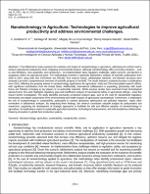Nanotechnology in Agriculture: Technologies to improve agricultural productivity and address environmental challenges

View/
Author(s)
R.-F., S. Jonathan
Benites, Santiago M.
De La Cruz-Noriega, Magaly
Nazario-Naveda, Renny
Delfin-Narciso, Daniel
Date
2025-07-15Metadata
Show full item recordPublisher
International Academy of Science, Engineering and Technology
Journal
Proceedings of the International Conference of Theoretical and Applied Nanoscience and Nanotechnology
Abstract
This bibliometric study examines the evolution and impact of nanotechnology in agriculture, addressing the critical need to enhance agricultural productivity while mitigating environmental impacts. Although nanotechnology offers promising solutions—such as nano-fertilizers, nano-pesticides, and nanosensors—its implementation faces regulatory challenges, safety concerns, and barriers to acceptance within the agricultural sector. The methodology involved a systematic bibliometric analysis of scientific publications from 2006 to 2024, using tools like VOSviewer and RStudio. Key research trends, collaboration networks, and thematic structures were assessed to provide a comprehensive overview of scientific progress in the field. The results indicate a sustained increase in publications since 2016, reflecting the growing interest in nanotechnology applications for agriculture. India and China lead global research efforts, with significant contributions from the United States. Additionally, international collaboration is expanding, particularly with South Korea and Pakistan emerging as key players in co-authorship networks. While previous studies have examined broad technological advancements, this work highlights regulatory gaps and insufficient analysis of nanomaterial safety in agricultural settings—areas that require further investigation. The study identifies previously unreported research gaps, such as the need for standardized regulatory frameworks and deeper assessments of the environmental and health impacts of agricultural nanomaterials. Furthermore, it emphasizes the role of nanotechnology in sustainability, particularly in nutrient absorption optimization and pollution reduction—topics often overlooked in bibliometric analyses. By integrating these findings, this research contributes valuable insights for policymakers and researchers, supporting the development of strategic approaches to facilitate the safe and effective adoption of nanotechnology in agriculture. Its implications extend to sustainable agricultural practices, technological advancements, and interdisciplinary collaboration, fostering innovation in global food production systems.
Type
info:eu-repo/semantics/article
Rights
info:eu-repo/semantics/openAccess
Language
eng
Collections
- Ingeniería Ambiental [98]

